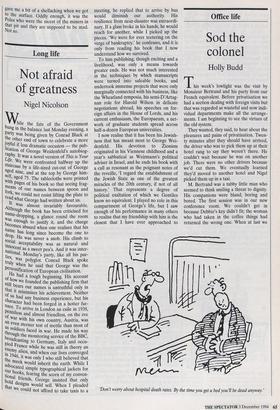Long life
Not afraid of greatness
Nigel Nicolson
hung in the balance last Monday evening, a Patty was being given by Conrad Black at the other end of town to celebrate a more Joyful if less dramatic occasion — the pub- lication of George Weidenfeld's autobiog- raphy, It was a novel version of This is Your Life. We were confronted halfway up the staircase by a life-sized cut-out of George aged n; -Ale, and at the top by George him- self, aged 75, The tablecloths were printed With Pages of his book so that seeing frag- ments of our names between spoon and fork, we could not resist lifting the plate to read what George had written about us. It was almost invariably favourable. Although the book has been criticised for naMe-dropping, a glance round the room was enough to justify it, and the charge becomes absurd when one realises that his name has long since become the one to drop. He was never a snob. His climb to social acceptability was as natural and innocent as a sweet pea's. And it was inter- national. Monday's party, like all his par- ties, was polyglot. Conrad Black spoke truly when he said that George was the Personification of European civilisation. He had a tough beginning. His account of how we founded the publishing firm that still bears our names is untruthful only in that It minimises his achievement. Neither of us had any business experience, but his character had been forged in a hotter fur- nace. To arrive in London an exile in 1938, Penniless and almost friendless, on the eve of war with his own country, Austria, was an even sterner test of mettle than most of US soldiers faced in war. He made his way through the monitoring service of the BBC, broadcasting to Germany, Italy and occu- pied France while he was still in theory an enemy alien, and when our lives converged in 1946, it was only I who still believed that the meek would inherit the earth. While I advocated simple typographical jackets for oor books, fearing the scorn of my conven- tional friends, George insisted that only bold designs would sell. When I pleaded that we could not afford to take taxis to a meeting, he replied that to arrive by bus would diminish our authority. His resilience from near-disaster was extraordi nary. If a glass broke in his hands, he would reach for another, while I picked up the pieces. 'We were for ever teetering on the verge of bankruptcy,' he confesses, and it is only from reading his book that I now understand how we survived.
To him publishing, though exciting and a livelihood, was only a means towards greater ends. He was not much interested in the techniques by which manuscripts were turned into saleable books, and undertook immense projects that were only marginally connected with his business, like the Wheatland symposia, his semi-D'Artag- nan role for Harold Wilson in delicate negotiations abroad, his speeches on for- eign affairs in the House of Lords, and his current enthusiasm, the Europaeum, a net- work of graduate students spread across half-a-dozen European universities.
I now realise that it has been his Jewish- ness that has meant most to George Wei- denfeld. His devotion to Zionism originated in his Viennese childhood and a year's sabbatical as Weizrnann's political adviser in Israel, and he ends his book with a call as resonant as the poignant notes of the reveille, 'I regard the establishment of the Jewish State as one of the greatest miracles of the 20th century, if not of all history.' That represents a degree of political exaltation of which we Gentiles know no equivalent. I played no role in this compartment of George's life, but I saw enough of his performance in many others to realise that my friendship with him is the closest that I have ever approached to Don't wony about hospital death rates. By the time you get a bed you'll be dead anyway.'










































































 Previous page
Previous page